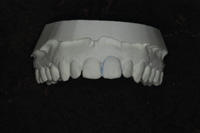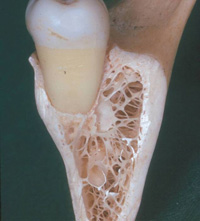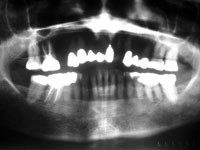At the age of 44, John would be considered by most people to be successful: a happy marriage, 3 children, a beautiful home, a lakeside getaway, community involvement, and a very lucrative dental practice. He’s worked hard to have it all. He has a life most would envy. So, what’s the problem?
John says he feels overwhelmed by the daily chores of seeing patients and keeping his wife and staff happy. He feels like he’s being pulled in 1,000 directions at a time. It’s gotten to the point that he just isn’t enjoying life anymore, and he’s concerned about thoughts he has been privately having—thoughts he doesn’t dare share with anyone. He’s feeling anxious, depressed, restless, and he doesn’t have the energy to get up and face another day, much less another 20 years. He knows he can regain control of his life and start enjoying it again, but he just doesn’t know where to start. He would love to spend more time with his family, but his practice is requiring more and more of him—physically, mentally, and emotionally. Staff come and go, he feels stressed by the economy, and he feels challenged and confused by all of the practice management advice he reads. By the time he gets home each day, he’s exhausted and wants to be left alone. What he really values–and how he would prefer to spend his time–has gotten lost in the flurry of daily activities, responsibilities, and challenges.
But John just made a great move: he hired a coach.
| Table. Coaching Resources |
|
(1) About coaching or finding a coach: the Internet
The International Coach Federation (ICF)
• internationalcoachfederation.org
The international regulatory group, which sets standards for coaches who want to be certified, also offers an online referral service for people looking for a coach.
Additional coach search engines include the following:
• coachville.com
• 247coaching.com
• internationalcoachdirectory.com
You can also find out more information about coaching at these same sites. The ICF also lists the 17 accredited coach training programs, many—but not all—of which are in the United States.
(2) About coaching: books
Although many self-help books mention coaching, some noteworthy titles include the following:
• The Portable Coach by Thomas Leonard. Thomas was considered the father of modern coaching and is the founder of Coach U and a founding member of ICF.
• Life Makeovers by Cheryl Richardson. Cheryl is probably one of the most publicly visible coaches in the business. She was the first president of ICF and regularly appears on “Oprah.”
• Coaching: Evoking Excellence in Others by James Flaherty. This book is an incredible resource that links coaching knowledge and theory.
• Co-Active Coaching by Laura Whitworth, Henry Kimsey-House, and Phil Sandahl. A wonderful book that includes a multitude of practical coaching tools, exercises, questions, and knowledge.
• Coaching for Performance by John Whitmore. This book helps you learn about the art and skill of good coaching, and understand the immense value that coaching has to offer.
|
IS COACHING THE RESOURCE FOR YOU?
Coaching is a new resource available to dentists who want to have an edge. Whether you want to attract more patients, learn to say no to your limited time schedule, clear the clutter out of your life, reconnect with what’s most important to you, find meaning in your work, or more balance in your life, a coach can help you do it.
If you haven’t heard of coaching, you may be in the minority. It has exploded onto the business scene in recent years. Originally created to be about life designing, coaches are used in situations that range from lifestyle to career transitions, from business turnarounds to profitability, and from life/work balance to creativity. For example, business coaches help clients improve communication skills with their patients and staff, create a larger picture of their practice, and be their own private sounding board for ideas, frustrations, and goals. Personal coaches work with clients looking to enhance and enrich their personal life, find balance and meaning, and improve relationships. More than 20% of the Fortune 500 companies now utilize coaches to assist their executives, CEOs, and managers. Articles about coaching have appeared in magazines from Time to Real Simple, in newspapers from USA Today to the Wall Street Journal, and on radio and TV shows nationally and locally.
WHAT ROLE DOES COACHING HAVE IN DENTISTRY?
What’s the connection of coaching to a dental practice? Regardless of whether the objective is a business or personal one, coaching can be extremely positive for dentists in any practice scenario, whether it’s a small, upstart, solo practice; a multidoctor, multi-office practice; or a high profile, state-of-the-art facility and teaching center. The applications of coaching in any and all of these areas vary tremendously and are dependent upon the dentist’s personal or business objectives. For example, a doctor’s practice is experiencing an ever-increasing cycle of losing patients despite marketing efforts, ongoing CE, and improvements to the physical facilities of the practice. Or perhaps the doctor is no longer enjoying his practice and wants to change it to something that more closely aligns with his values. The possibilities are endless.
PROFESSIONAL COACHING VERSUS OTHER MODELS OF PERSONAL AND PROFESSIONAL DEVELOPMENT
Most often, coaching is compared to older models of personal and professional development such as mentoring and consulting, but coaching is really something unlike either of these. Unlike mentoring, the coach has no personal agenda for the client. The coach’s basic objective is to assist the client in designing a life that is consistent with the client’s values, goals, and dreams. Unlike consulting, the coach is not the “expert” who tells the client what to do. Coaching views the client as the expert in determining what is most important to the client, then supports the client in staying true to what he or she really wants. In short, coaches assist clients in finding their personal truth, then living it.
Unlike therapy, coaching is not concerned with resolving past issues. The coaching model is forward-looking and action-oriented. The ultimate objectives are to identify what the client wants, determine the steps to get there, and act on it. Clients can easily reach their goals at twice the speed than they normally could by doing it alone.
MEET BOB, A SUCCESSFUL DENTAL CONSULTANT
Coaching is very effective with dental staff members, office administrators, dental hygienists, and dental consultants. Another real life example is about Bob, 46, a dental consultant who has been traveling all over the country for the past 15 years speaking at dental conferences and maintaining a busy dental consulting practice. Bob is frustrated and burned out. He feels he’s not nearly as effective as he could be, and he knows that the dentists he works with could achieve so much more than what they’re doing now. He’s very knowledgeable about the dental profession and well respected in the dental community, but he just can’t seem to make any lasting changes in the practices he works with. What Bob wants is to quit having to be “the answer man” and instead develop collaborative partnerships with his clients whereby they solve their own problems without having to pick up the phone to call him. He’s looking to assist them in a process that results in them becoming excellent long-term producers and performers who can solve their own problems with their own skills and knowledge. In essence, these clients will create a tremendous shift in their practices, which Bob will soon discover creates amazing shifts and benefits in his personal life, too.
Bob’s coach began by looking at those parts of Bob’s consulting practice that weren’t working and began to collaborate on ways to solve those issues. Bob readily identified being tired of always having to come up with a solution to all of the doctors’ problems. Working with his coach, he began honing his communication and relationship skills. Now he doesn’t have to come up with the answers, and he’s very adept and skilled at facilitating and advising, rather than consulting. And he loves it. Furthermore, the doctors and staffs he works with love to see him now and are eager for his ideas and suggestions. Bob enjoys the relationships and has discovered new-found energy and excitement for his work. He has discovered that he doesn’t have to manufacture the personal energy to solve all his clients’ problems. And the bonus is now he’s able to develop other parts of himself, enjoy his life much better, and be available and responsive to his family, friends, and business acquaintances in ways not possible before.
SO, TELL ME MORE ABOUT COACHING…
Coaching is not a “one-size- fits-all” proposition. Coaches come from every type of professional background, including business, sales, medicine, law, psychology, human resources… and even dentistry. Most coaches participate in some type of training program. These programs vary and not all are accredited by the International Coach Federation (ICF, see Table), which also enforces the standards for the practice of coaching.
One of the oldest and most respected programs is the one offered by Coach U, a virtual training university that offers upwards of 50 teleclasses via conference call to students all over the world. Completing an accredited program such as one offered by Coach U is necessary to become certified by ICF. Because the practice of coaching is not regulated by law (at this time), anyone can call himself or herself a coach (unfortunate as that may be). It’s important to know the qualifications of the coach you’re considering.
Coaches find themselves working in a niche–a specialized area of coaching–either by training or interest or by previous background and experience. Coaches can specialize in areas as diverse as ADD (Attention Deficit Disorder), health and fitness, nonprofit organizations, and organizational development. If you’re looking for someone who understands what you face in your practice from day to day, coaches are available who are themselves practicing dentists and professional coaches.
WORKING WITH YOUR OWN COACH
Dentists typically find themselves consumed with running their practice and dealing with the unlimited demands that seem to surface daily. Working with a coach, dentists welcome the opportunity to work on their business instead of inside it. They have the opportunity to reflect on what they’re doing, to identify their interests and values, and to have a silent, objective partner—essentially like having their own private board of directors. Because most dentists have a solo practice, they’re constantly second-guessing what they’re doing, trying to identify market trends, trying to keep up with changing technology and knowledge, hiring, firing, managing—you name it. Add a little government or other third-party intervention, and it’s overwhelming to most of them. Attending practice management programs, workshops, and seminars helps, but the underlying message they are often left with is, Do it like me. Most dentists struggle for years trying to emulate other dentists, almost always without success.
Coaching draws on dentists’ knowledge, intuition, innate wisdom, and individual experience and skills, and uses those qualities to help them develop the practice of their own dreams–not someone else’s dreams. A coach may enhance those skills with further skills training such as relating, listening, advising, and strategizing. The possibilities are practically endless, and a dentist may choose to work with a coach for business or personal reasons–or both.
What makes coaching so effective is due to many aspects inherent in the coaching process. For example, accountability is critical. Once you’ve identified what you want for your practice or for yourself, a coach assists you in keeping on track. Coaching is also highly valuable because it gives you someone else’s perspective–
someone you trust because he or she knows you and your goals. This, in turn, opens possibilities that may have been hidden to you. A coach is a great sounding board for what’s working and what’s not, something extremely valuable to mostly isolated dentists and solo business owners.
On a more personal level, because many dentists are so successful in the eyes of the public, they typically have no one to talk to about their reality. What good is it to own your own practice, make good money, and be involved in your community if you really aren’t happy or having fun?
CONCLUSION
Is coaching right for you? Behind successful people are many people who assisted them in achieving their goals, whether it’s Tiger Woods, Kristi Yamaguchi, Ken Blanchard, or any host of others… people who recognized the value of coaching.
So, if you’re feeling stuck, pressured, out of touch, or overwhelmed, working with a coach just might be your ticket to finding that success, happiness, and fulfillment you’ve been searching for.
Dr. Deems is a Little Rock, Ark-based full-time practicing dentist and a professionally trained coach who specializes in coaching dentists, dental consultants, and other dental professionals. He is a fellow of the Academy of General Dentistry, a diplomate of the Pierre Fauchard Academy and the American Academy of Pain Management, and holds memberships in many organizations. He is a 1987 honor graduate of Baylor College of Dentistry and received his professional coach training from Coach U. He recently received the 2003 Arkansas Psychologically Healthy Workplace award. He is the first dentist to be honored with such an award. For more information about coaching, call (866) 663-9903 or visit drdondeems.com.










